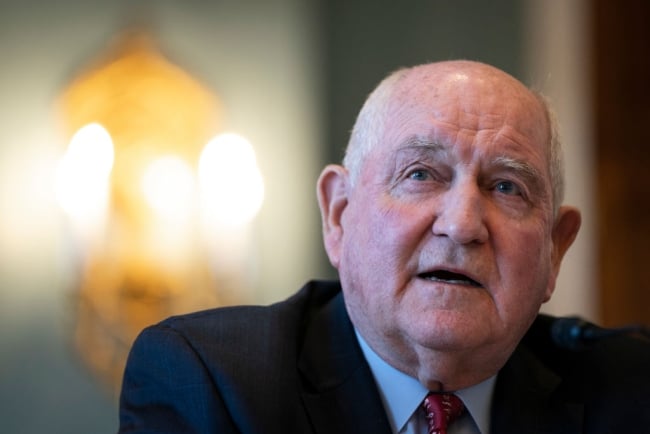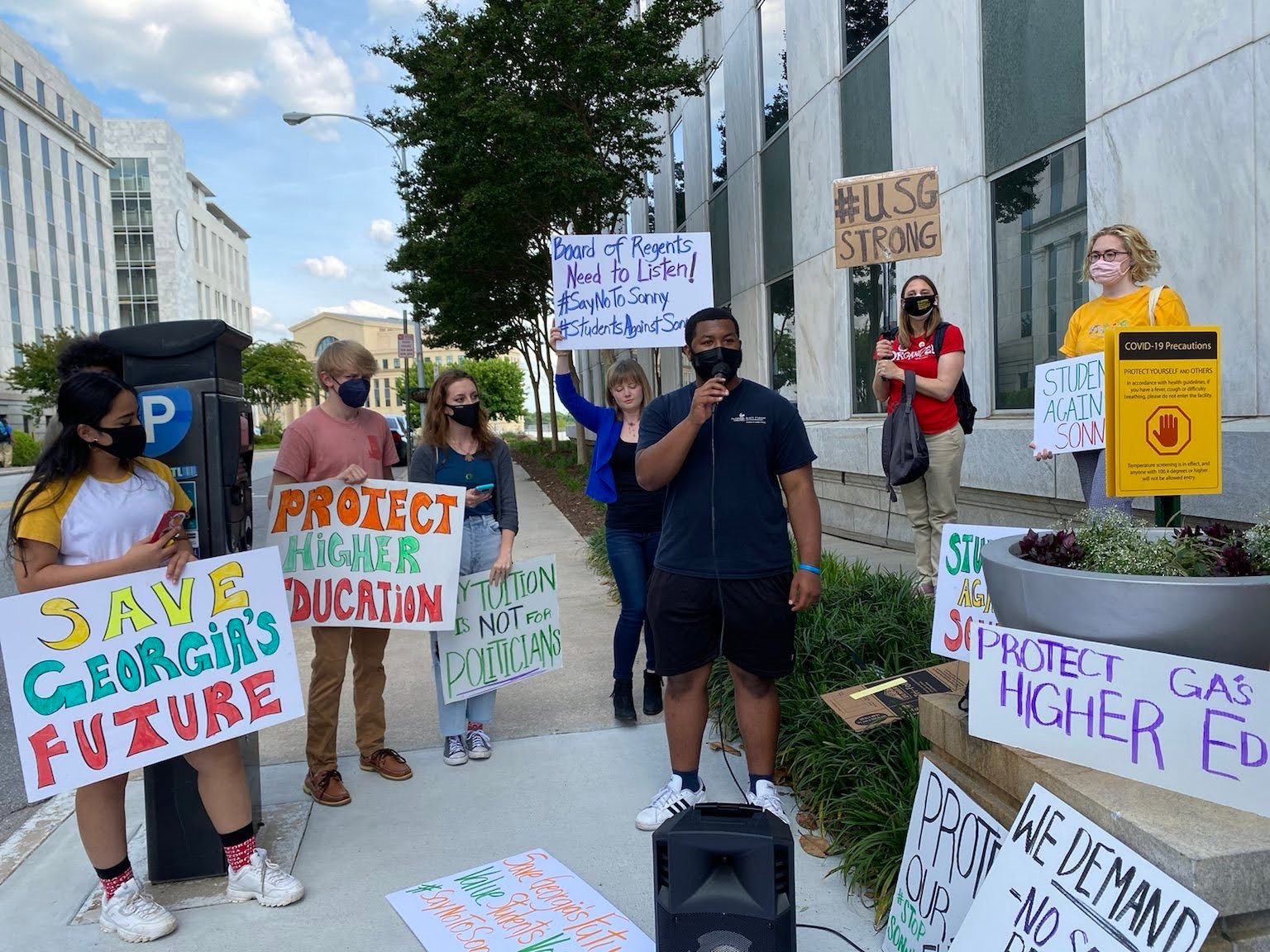You have /5 articles left.
Sign up for a free account or log in.

Sonny Perdue served as U.S. secretary of agriculture from 2017 to 2021 under former president Donald Trump.
Drew Angerer/Staff/Getty Images
In the face of widespread opposition, the University System of Georgia Board of Regents voted Tuesday to name former two-term Georgia governor Sonny Perdue the sole finalist for the open system chancellorship.
“USG and its institutions have an international reputation of innovation, workforce preparation and student success and that attracted an outstanding group of candidates for the Board to explore,” Harold Reynolds, chair of the board, said in a statement Tuesday. “Ultimately, Gov. Perdue stood out for his impressive experience and leadership in public service as well as a vast understanding not only of Georgia and its communities but of the issues facing the university system as we move forward.”
The board still needs to rubber-stamp Perdue’s appointment later this month, but Tuesday’s vote asserts the former U.S. agriculture secretary as the likely successor to ex-chancellor Steve Wrigley, who retired in June. Ever since The Atlanta-Journal Constitution revealed last March that the board was considering Perdue for the position, his path to lead the 26-institution system has been hobbled by objections from students, faculty members and other stakeholders.
Students Against Sonny, a group fighting Perdue’s imminent appointment, has organized protests, phone banks and petitions urging the regents to drop Perdue as a candidate. Students across the state fear that Perdue will defund the university system and contribute to the increasing political interference in academia, said Alex Ames, a sophomore at the Georgia Institute of Technology and organizer of the group.
“My parents are public school teachers. I am a public school student. I grew up dealing with the consequences of having a governor and a state Legislature that defunded our education system by over $10 billion in two decades,” she said. While Perdue was governor, he decreased funding for public education, was sued for underfunding historically Black colleges and universities in the state, and supported reinstating a state flag with a large Confederate symbol.
Despite their efforts, student activists have heard nothing from the Board of Regents in the last 10 months. The lack of communication is disappointing, Ames said.
“It’s really terrifying to imagine that this appointment process is completely out of our hands—no matter if we protest, no matter if we prove that his record is not worthy,” Ames said. “They’re still going to appoint him anyway.”
 Faculty members say Perdue is unqualified for the job. They are also concerned about his history as a climate-change denier and his political background.
Faculty members say Perdue is unqualified for the job. They are also concerned about his history as a climate-change denier and his political background.
“Perdue has no [sic] absolutely no experience in higher education leadership,” the American Association of University Professors said in a statement Monday. “Moreover, during his tenure as secretary, the Department of Agriculture reportedly buried publicly funded, peer-reviewed research showing the dangers of climate change to agriculture and public health, and cherry-picked for promotion studies that favored the meat industry, damaging the credibility of the department and allowing politics to intrude into what should be nonpartisan scientific research. In interviews, Purdue has expressed skepticism about the causes of climate change despite overwhelming worldwide scientific consensus.”
In a statement about his selection, Perdue touted his experience at the U.S. Department of Agriculture under former president Donald Trump.
“Higher education is where I wanted to have a real impact as governor, only to be stymied by twin recessions. It is what I benefited from as Agriculture Secretary, where I saw daily the benefits of university research,” Perdue said. “I want to make a difference by providing leadership and resources so that faculty can thrive in their teaching, research and service and students are inspired and supported so they graduate, find rewarding careers and become productive citizens.”
In June, the Southern Association of Colleges and Schools Commission on Colleges raised potential red flags about the search process. A letter from president Belle Wheelan explained that the board would be out of compliance—and therefore at risk of losing its accreditation with the agency—if it allowed political interference in the chancellor search process or selected candidates without appropriate qualifications. The letter followed the initial public outcry over Perdue’s candidacy, a decision by the board to temporarily pause its search and the abrupt departure of the firm the board first hired to conduct the search.
Matthew Boedy, president of the Georgia AAUP chapter, wrote to Wheelan Tuesday and asked her to send a second “letter of warning” to the board.
But Wheelan told Inside Higher Ed she was satisfied with the board’s search process. The agency’s standards do not dictate specific qualifications for chancellors or presidents, she said, and she noted that people with a variety of career backgrounds have served in higher education leadership roles.
“They developed and carried out a process that included the interviewing of several candidates. We are satisfied that the board is naming the finalist,” Wheelan wrote in an email. “I’m sure the Board will be able to document the appropriate skill set of Mr. [Perdue] to show he is qualified to lead the University System of GA.”
Boedy expressed concern primarily with several recent appointments that Governor Brian Kemp made to the Board of Regents. Last month, Kemp, a longtime ally of Perdue, tapped three new members for the board: Richard “Tim” Evans, Jim Syfan and Tom Bradbury. All three new members support Perdue, the Journal-Constitution reported.
Erin Hames, vice chair of the board, also has ties to Perdue—she served as Perdue’s policy director and chief of staff at the Georgia Department of Education while he was governor.
Perdue’s appointment appears to be an “attempt at political interference,” said Jill Derby, a senior consultant at the Association of Governing Boards consulting group. She worries about the consequences of growing political involvement in higher education.
Susan Resneck Pierce, a higher education consultant and president emerita of the University of Puget Sound, said she hopes that the University System of Georgia regents listen to faculty input about leadership decisions.
“Although the notion of citizen-boards is typical for colleges and universities, I have long been concerned that fewer than 10 percent of trustees or regents nationally have had any professional experience on a campus, many of those in nonacademic areas,” Pierce said. “Yet it would be unimaginable for corporate boards to be comprised mainly of academics rather than people with expertise in the work of the corporation. The University of Georgia System Board is fairly typical in having no members with higher ed expertise. For that reason, I would hope that it would give genuine consideration to the collective wisdom of the faculty about matters that affect the academic programs, such as the selection of a president.”
Students remain concerned that Perdue’s tenure as system chancellor will echo his time as governor. Abeeha Bhatti, a Pakistani American high school senior in Snellville, Ga., is planning to pursue a degree in biomedical engineering. She hopes to attend one of the University System of Georgia institutions but fears that Perdue’s chancellorship could make it difficult for her to attend college in the state.
“I’m a first-generation, low-income student, and I’m a minority, and Sonny Perdue doesn’t really support people like me,” Bhatti said. “He has a history of defunding schools, so I would be scared that my chance to go to college and stay in college for all four years might be taken away.”




